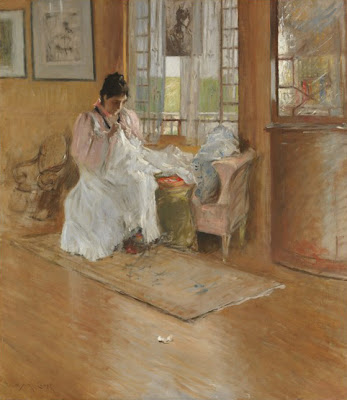 |
| 1885 Self-Portrait oil on canvas |
This is the first part of a five-part post on the works of Swiss-born artist Félix Vallotton (1865 – 1925), a painter and printmaker associated with Les Nabis. He was an important figure in the development of the modern woodcut.
Parts 1 – 3 will look at Vallotton’s paintings; parts 4 – 5 at his woodcuts. Personally I believe his woodcuts are his stronger suit – the paintings for me vary enormously in quality and style, but I’m doing a quite extended post to get an objective view of his work.
Félix Vallotton was born in Lausanne, Switzerland in 1865. In 1882 he moved to Paris to study art under at the Académie Julian. His earliest paintings, chiefly portraits, are firmly rooted in the academic tradition. In 1885 he painted his first painted self portrait which received an honourable mention at the
Salon des artistes français in 1886.
During the following decade Vallotton painted, wrote art criticism and made a number of prints. In 1891 he executed his first woodcut, a portrait of Paul Verlaine. The many woodcuts he produced during the 1890s were recognized as innovative, and established Vallotton as a leader in the revival of true woodcut as an artistic medium (see part 4 and 5 of this post for more about Vallotton’s woodcuts).
By 1892 he was affiliated with Les Nabis, a group of young artists that included Pierre Bonnard, Ker-Xavier Roussel, Maurice Denis, and Edouard Vuillard, with whom Vallotton was to form a lifelong friendship. During the 1890s, when Vallotton was closely allied with the avant-garde, his paintings reflected the style of his woodcuts, with flat areas of colour, hard edges, and simplification of detail. His subjects included genre scenes, portraits and nudes. Examples of his Nabi style are the deliberately awkward
Bathers on a Summer Evening (1892–93) and the symbolist
Moonlight (1895).
 |
| 1892 Bathers on a Summer Evening |
 |
| 1895 Moonlight |
In 1899 Vallotton married Gabrielle Rodrigues-Henriques, a wealthy young widow with three children, and in 1900 he attained French citizenship. Around 1899, his printmaking activity diminished as he concentrated on painting, developing a sober, often bitter realism independently of the artistic mainstream. His
Portrait of Gertrude Stein (1907) was painted as an apparent response to Picasso’s portrait of the previous year, and in
The Autobiography of Alice B. Toklas Stein described the very methodical way in which Vallotton painted it, working from top to bottom as if lowering a curtain across the canvas.
 |
| 1907 Portrait of Gertrude Stein |
Vallotton's paintings of the post-Nabi period found admirers, and were generally respected for their truthfulness and their technical qualities, but the severity of his style was frequently criticized. Typical is the reaction of the critic writing in
Neue Zürcher Zeitung, complained that Vallotton "paints like a policeman, like someone whose job it is to catch forms and colours. Everything creaks with an intolerable dryness ... the colours lack all joyfulness.” In its uncompromising character his art prefigured the New Objectivity that flourished in Germany during the 1920s, and has a further parallel in the work of Edward Hopper.
Vallotton responded in 1914 to the coming of WW1 by volunteering for the French army, but he was rejected because of his age. In 1915–16 he returned to the medium of woodcut for the first time since 1901 to express his feelings for his adopted country in the series
This is War, his last prints. He subsequently spent three weeks on a tour of the Champagne front in 1917, on a commission from the Ministry of Fine Arts. The sketches he produced became the basis for a group of paintings,
The Church of Souain in Silhouette among them, in which he recorded with cool detachment the ruined landscape.
 |
| 1917 The Church of Souain in Sihlouette |
In his last years Félix Vallotton concentrated especially on still lifes and on "composite landscapes”, landscapes composed in the studio from memory and imagination. Always a prolific artist, by the end of his life he had completed over 1700 paintings and about 200 prints, in addition to hundreds of drawings and several sculptures. He died in Paris in 1925.
 |
| 1886 Paul Valloton |
 |
| 1892 The Invalid oil on canvas |
 |
| 1893 Portrait of Edouard Vuillard |
 |
| 1895 Street Scene |
 |
| 1895 The Bistro |
 |
| 1895 The Laundress |
 |
| 1896 The Mistress and the Servant oil on cardboard |
 |
| 1897 Passerby |
 |
| 1897 Self-Portrait oil on cardboard |
 |
| c1897-8 Naked Women with Cats oil on cardboard |
 |
| 1898 Intimacy |
 |
| 1898 Private Conversation |
 |
| 1899 Bathing |
 |
| 1899 Sleeping Woman |
 |
| 1899 The Fourteenth of July at Etretat |































































